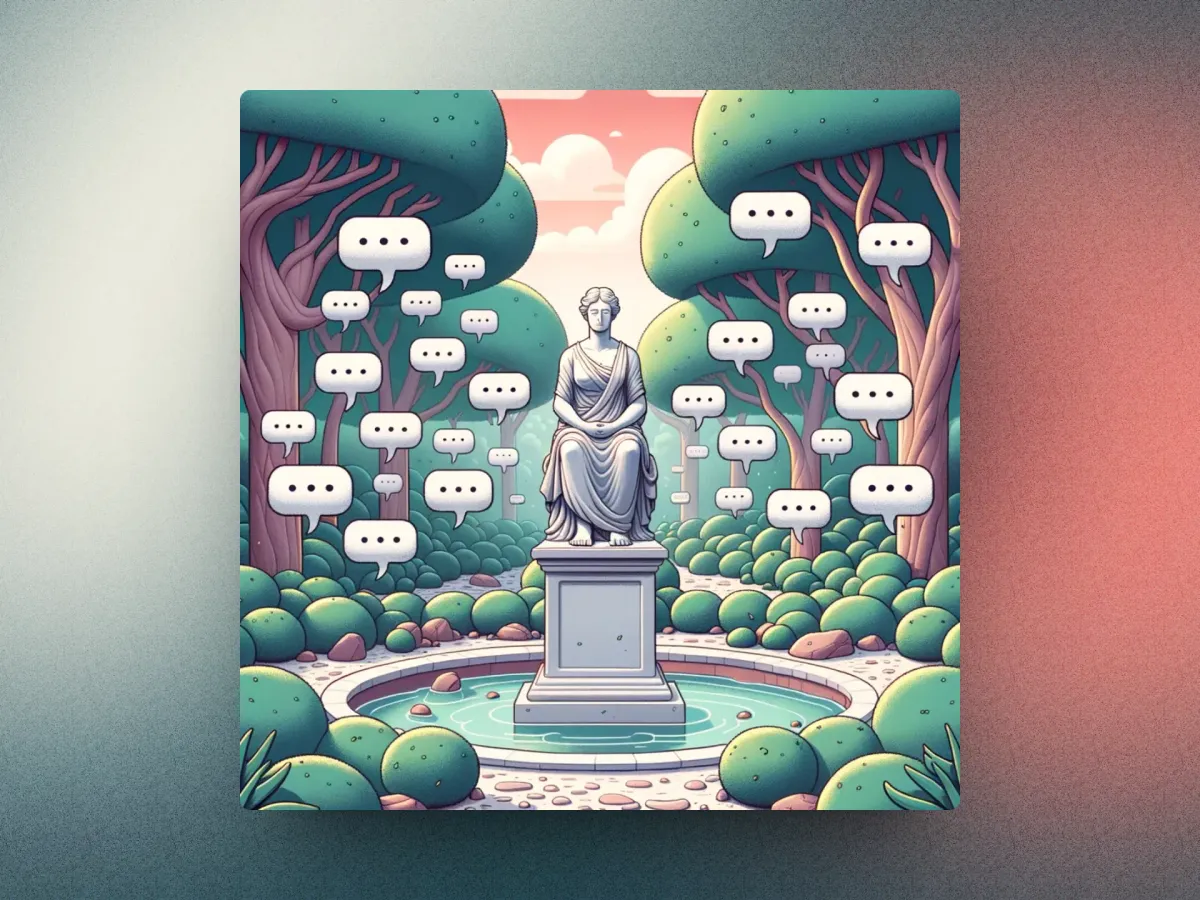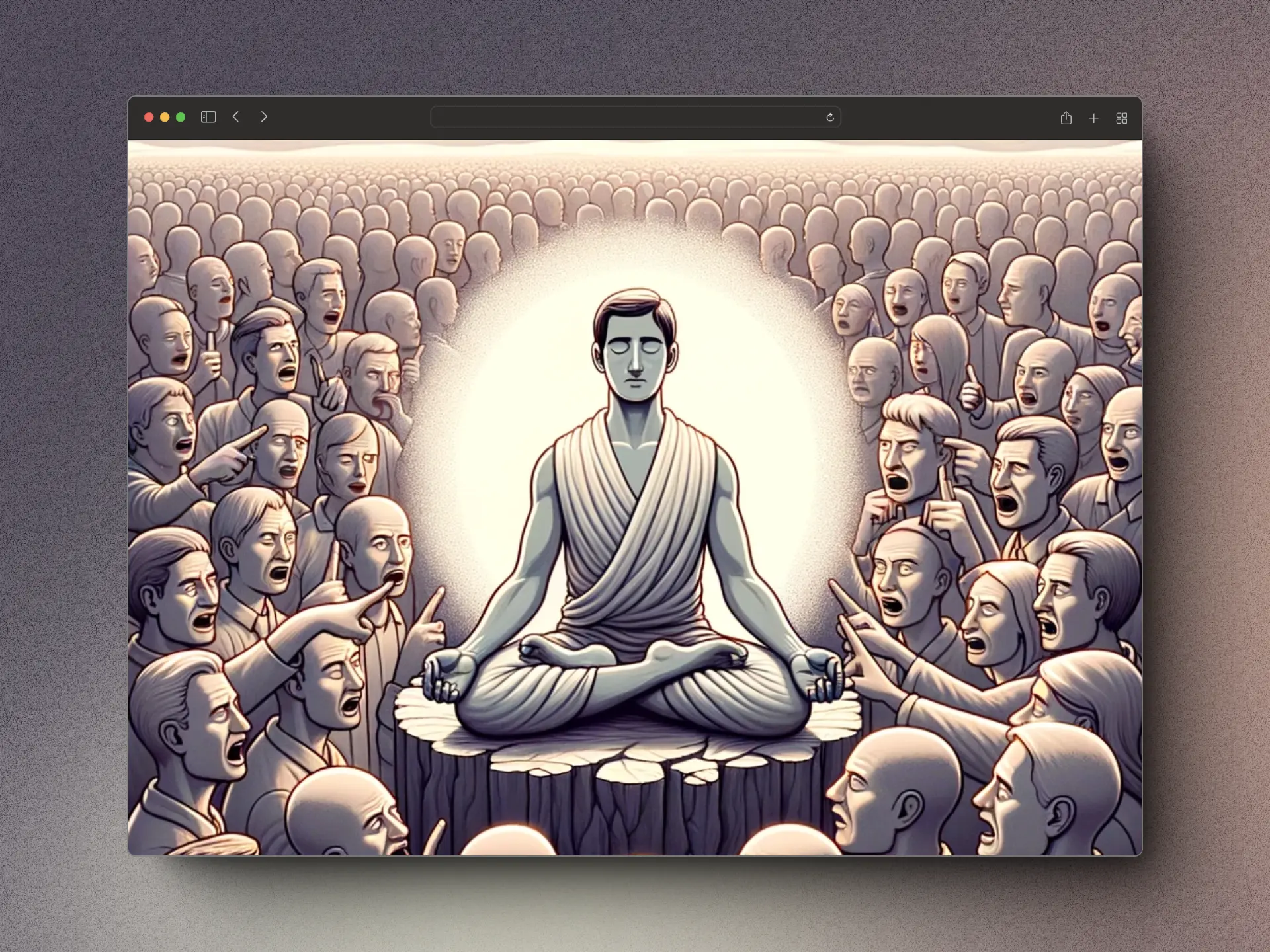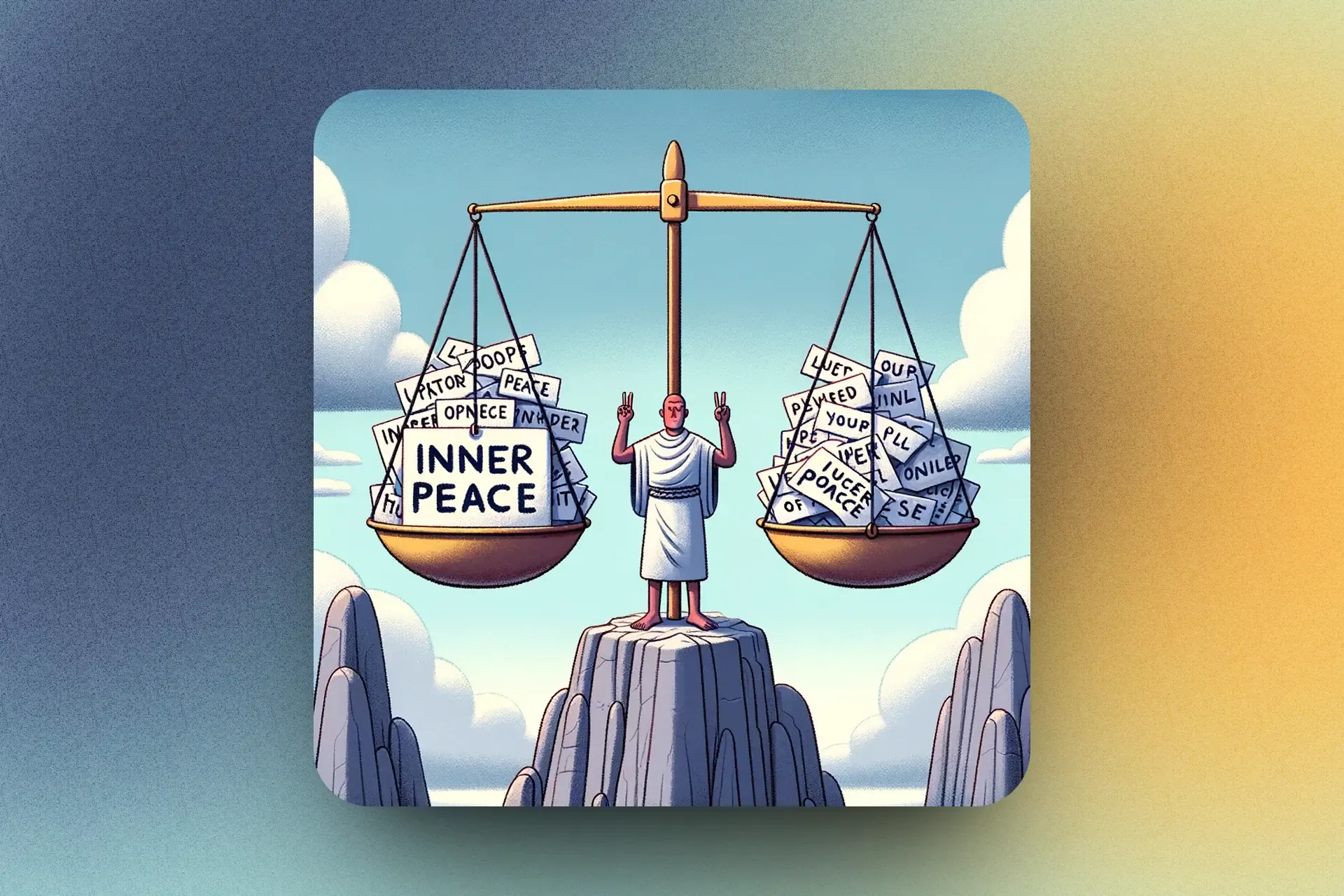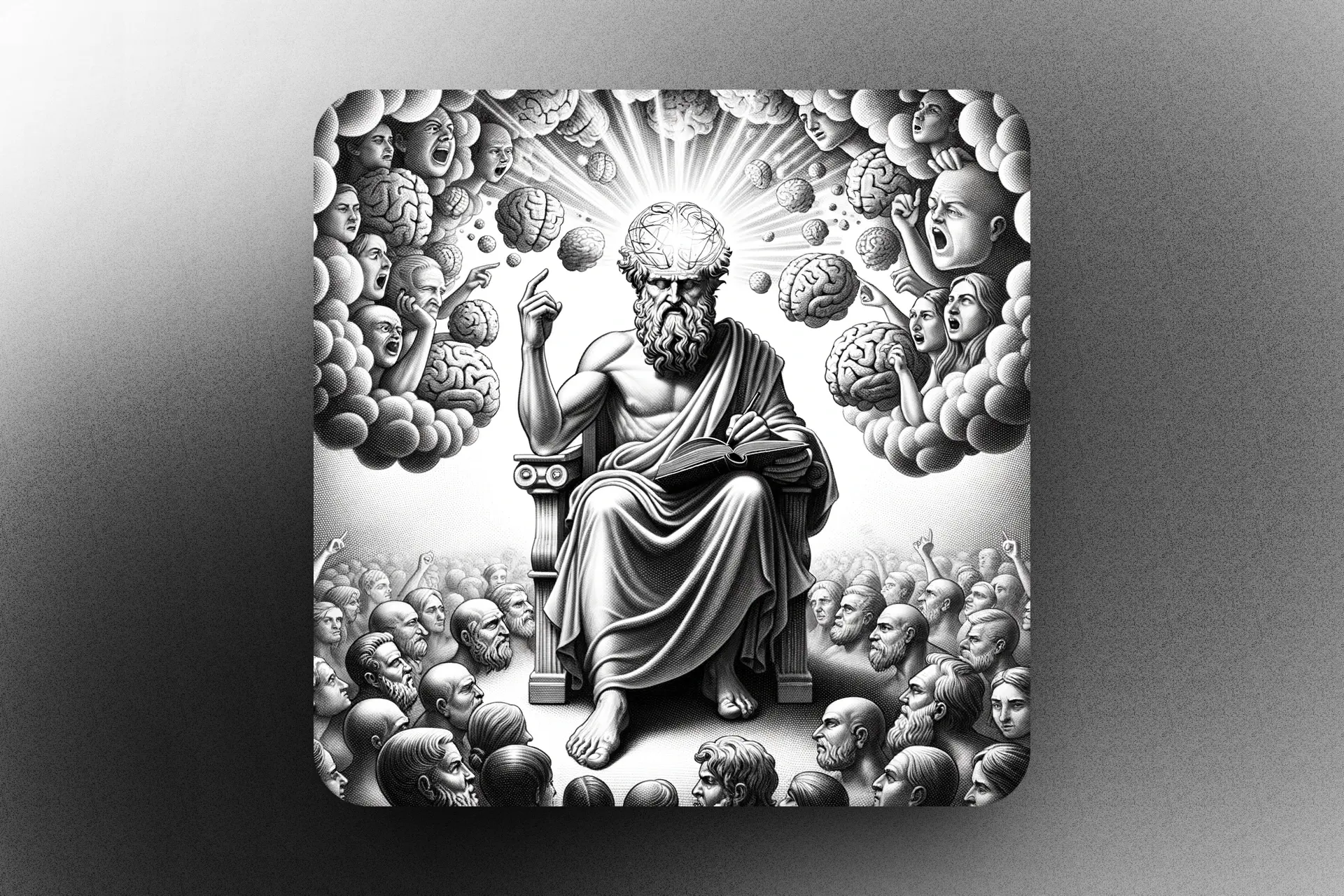The stoic art of not caring what other people think

We all want to be liked and respected. But making our self-worth contingent on others' opinions can lead to constant anxiety and fragility. The ancient philosophy of Stoicism offers a different path - finding inner strength by not basing our value on external validation.
Stoics advise focusing on what we can control - our own thoughts and actions, rather than things outside our control like fame or reputation. This indifference to others' judgments brings great freedom. As the Stoics realized, caring too much what people think often leads to envy, distraction, and stealing joy from ourselves.
In this post, we'll explore how practicing Stoic detachment from external opinions helps us stay focused on our own path. And how developing an inner sense of self-respect enables us to weather unfair criticism while staying true to our principles.
Why stoics say we shouldn't care what other people think?

A core Stoic teaching is to focus attention on what we can control rather than get caught up in external things we can't control. This includes other people's opinions and judgments.
Stoic philosopher Epictetus said we waste our time and energy thinking about "what other people are doing or saying." Instead, we should focus on "what you're thinking, what you're doing, what's going on in here." He stressed that the one thing we truly control is our own mind.
Marcus Aurelius, the Stoic Roman emperor, advised not comparing ourselves to others or getting distracted by what they have or do. He wrote, "Don't waste the rest of your time here worrying about other people—unless it affects the common good. It will keep you from doing anything useful."
Staying disciplined in our own lane without envying others requires enormous self-control. But it allows us to fulfill our own potential instead of chasing external markers of success.
Seneca the Younger, another renowned Stoic, described the importance of sticking to our own path "without being distracted by the paths that crisscross yours, even from those who are hopelessly lost."
We may cross paths with competitors or get drawn into fruitless social comparisons. But the Stoics recognized this leads nowhere productive. We end up stealing joy and tranquility from ourselves when we overly focus on what others are doing or saying.
Practicing indifference to external opinions and validation
The Stoics practiced active indifference to other people’s perceptions, rather than passively accepting society’s opinions as truth. They disciplined themselves not to need validation from others to feel self-worth.
When author Ryan Holiday moved to New Orleans, he didn't tell anyone he was working on a book. He explained this Stoic approach:
"I didn't want to get credit for writing a book. I didn't want people to ask me about the book. I didn't want validation for the book. I wanted to spend every day actually working on the project. That's what paid off."
This indifference to others' impressions allowed him to focus wholly on the work itself rather than seek external praise.
Stoics advise being content to be seen as foolish or "stupid" while improving at something. Because public perception is fickle, but the rewards of deep work are lasting.
How to stop caring what others think by understanding them

Stoics practiced analyzing critics and seeing them for who they really were. This diminished their anxiety about disapproval.
Marcus Aurelius advised to "look inside" detractors and recognize their pettiness or lack of wisdom. Seneca suggested imagining critics "naked" to see them as merely human rather than figures of authority.
Once we understand critics' weaknesses and addictions, their words lose power over us. Their disapproval says more about them than about our own worth.
Philosopher Zeno overcame social anxiety after his mentor Creides embarrassed him publicly for caring too much about appearances. Zeno realized no real harm came from others' perceptions. What mattered was living virtuously.
Focus on your own standards rather than external validation

Stoics argue we should measure ourselves against our own principles, not seek validation through fame, wealth, or applause.
Marcus Aurelius wrote, "Don’t pay attention to other people’s minds. Look straight ahead, where nature is leading you: nature through the things that happen to you through your own actions."
Epictetus said not to be ashamed of criticism, but to ask yourself calmly, "Is this assumption true? Why do I believe it?" This prevents falling prey to false impressions or beliefs.
Stoics taught freedom comes from self-respect - holding yourself to certain standards and knowing your worth. Then you act with inner confidence, rather than dependency on external praise.
This self-respect helps withstand unfair criticism while staying fixed on your values. Marcus Aurelius explained how to respond to those who argue in bad faith:
"When people injure you, ask yourself what good or harm they thought would come of it. If you understand that, you’ll feel sympathy rather than outrage or anger."
Release yourself from needing others affirmation

The more we examine critics' motives and characters, the less their words can shake our self-confidence.
Marcus Aurelius said to recognize most detractors as ignorant, cowardly, or confused. "What they think of you is none of your business," he wrote.
Stoics train themselves to be less self-conscious and not define self-worth by appearances. Seneca the Younger advised caring only about living virtuously, rather than seeking applause.
The Stoic sage stands on solid inner ground, adhering to his principles. He withstands the slings and arrows of critics through self-reliance, not dependency on external validation.
Conclusion
The Stoics realized that basing our sense of self on others' opinions leads to anxiety and loss of inner freedom. Their solution was cultivating an attitude of indifference toward external validation and focusing wholly on virtue and wisdom.
Putting these teachings into practice takes work. But the payoff is great - the tranquility and confidence that come from self-reliance. Stoic detachment allows us to navigate criticism and praise equally while staying true to ourselves.
FAQ
Why is it so hard not to care what other people think?
A: We're social creatures who naturally crave belonging and acceptance. Negative opinions can feel like a threat to our safety. It takes work to overcome our instinctive wiring and realize our worth comes from within.
But don't we need some external validation?
A: We need some feedback to grow, but should rely mostly on our own judgment. Be open to constructive criticism from wise mentors, but dismiss uninformed opinions.
What if important people like bosses or family criticize me?
A: Weight feedback from those close to us more heavily. But still judge it against our own principles and values. Retain inner autonomy even when considering wise counsel.
How can I develop more inner confidence and self-respect?
A: Self-respect comes from living by principles, acting with integrity, bettering yourself each day. Focus on behaviors under your control, not outside opinions.
What are some daily habits to care less about others' opinions?
A: Practice objective analysis of your critics. Keep an inner journal to record progress and principles. Reflect on what really matters to you.




